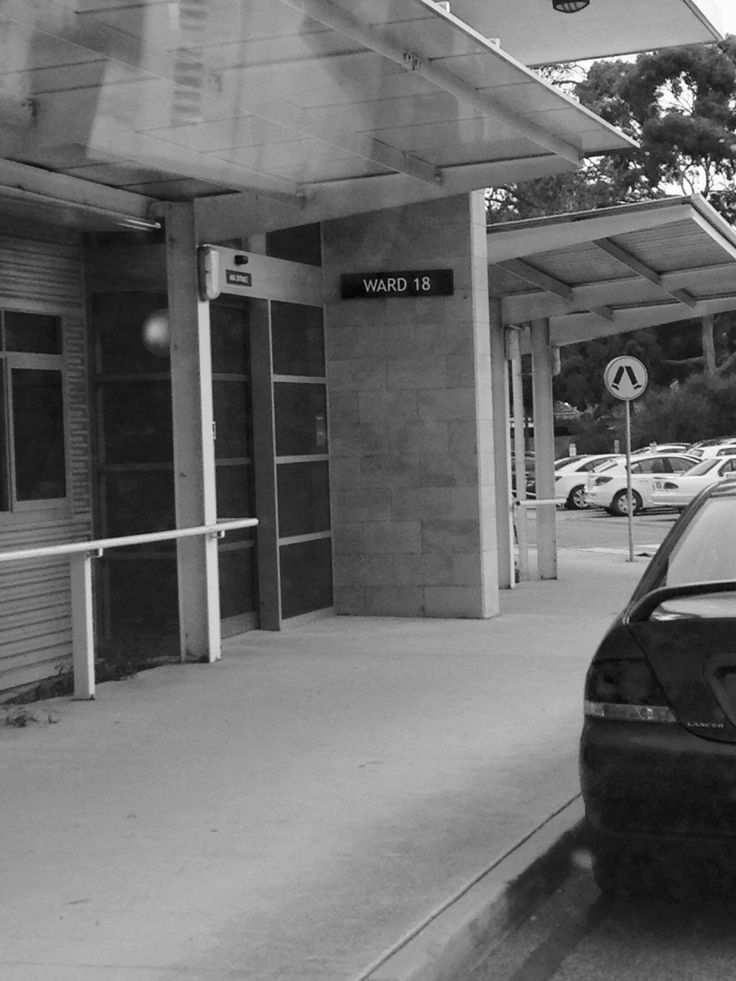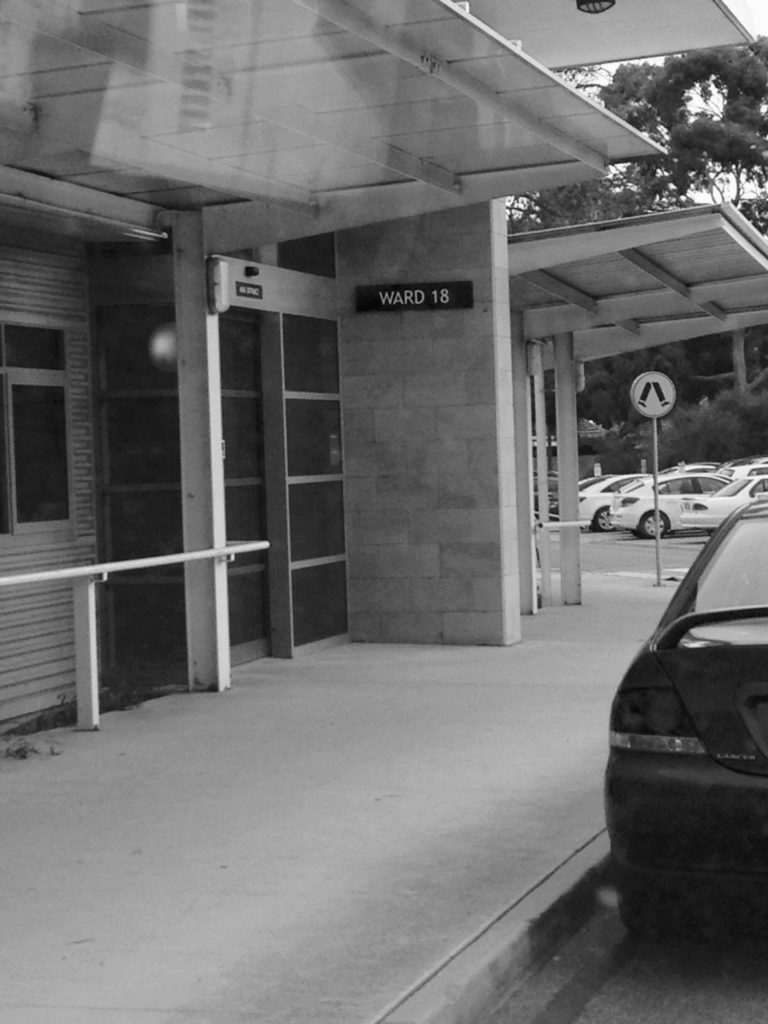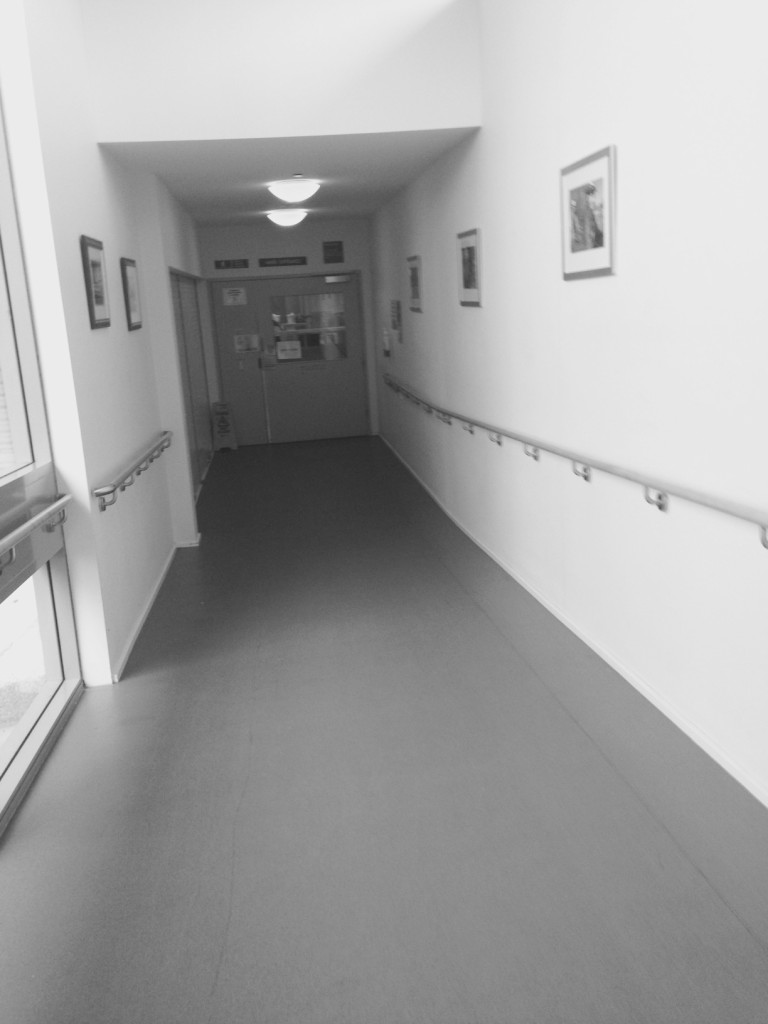Day 2 was certainly different for us as Mum and I entered the ward with mixed emotions. I kept thinking to myself “Will Dad be agitated or will he be happy?”. When we spotted Dad in the ward he was rapt to see us both. He gave us a huge hug and almost cried. We grabbed the footy and had a few kicks down the corridor like old times. Dad then wanted to sit on the communal couch in front of the tv, where he grabbed the Sunday Mail and started to read it. This was strange because no newspaper has engaged him in the last 12 months.
His speech was more coherent and he was doing plenty of laughing.It was lunchtime so we were ushered into the family room where we watched Dad eat lunch. He had a great meal of roast pork with all the trimmings, and I ate some off his plate as well. I was discreetly video recording Dad whenever he talked so I could capture his mood and behaviour changes. Mobiles are not normally allowed on the ward, but I was I was advised it was ok in the family room as long as I only filmed Dad.
Other patients kept walking in and had to be redirected. As we were in a high dependency ward, we were amongst some psychotic people. One guy told me how he wanted to ‘ slit his wife’s throat’, which was confronting so early in the piece. We enjoyed the lunch and the carer explained how Dad behaved overnight.
The carer then described the fine details of his Detaining Order under the Mental Health Act. This basically meant the State now has full control over Dad and where he ends up, and Dad is not able to be removed from the facility for 7 days when the order will be reviewed. I thought this was pretty over the top and long winded and actually scared Mum. I kept saying to the carer that “we want Dad to be here” ( voluntarily) as we felt he needed a Geriatrician and Psychiatrist’s help, as opposed to standard doctors. I can understand the majority of family members would not want to have their loved one detained, but we are so close to the action that we know this is the safest and best path for Dad.
It is obvious they are very drilled in the ward with a focus on watching patients closely. They follow their every move and are ready for any bad behaviours. It was clear they want to do all the nursing as we are limited to 90 minute visiting times during set hours. They are clearly more skilled carers than any other staff we have seen to date, and are very intense with how they monitor each patient. The ward has a feeling of a jail as the eyes are constantly on everyone’s moves and you need staff to buzz you in and out. The Oxazepam (calming medication)was spread out further to almost tempt Dad to be agitated. This would influence his new medication routines and med timings. We were told he became agitated on the first evening and they gave him a PRN (extra meds).
The following day I had a day off from visiting and enjoyed the lack of responsibility. My sister went in my place and was asked by a carer to help with the showering. Dad was was so confused, they ended up showering him with his tracksuit pants on. They filled up with water, became heavy and this forced Dad to remove them. After the shower and shave, Dad and my sister kicked the footy in the ward, but were getting strange looks from staff. She went and asked if there was a problem and they advised of an incident involving Dad after we left the day before.
Dad was kicking the footy with me on the previous day, and I left the footy on his lap for some comfort when we said goodbye. Not long after we had gone Dad was given a hot cup of tea by a carer. He became confused, thought he was holding his footy and kicked the cuppa like a football. There was a huge drama as the cup broke, mess was everywhere and the place was on edge as it was cleaned up. This really rocked the staff and was the first time Dad ever did anything like this.
The following day I visited Dad at 10.30am and found him in good spirits. I received a huge welcoming hug and my presence gave Dad a big relief. We were ushered into the family visiting room so we could talk alone without other patients intruding. Dad and I ran out of conversation after two minutes and Dad stared at me, smiled, and said ” So….now what?” Then burst into laughter. I decided to put some music on via the chained up cd player. The Elvis cd instantly had Dad dancing around the small room on his own. Every 5-10 minutes a staff member would open the door or peer threw a window to check on us. I was getting the feeling many of the patients in this ward are capable of anything.
I discreetly filmed Dad via my phone as I continue to document his progress and behaviours. I am hoping to catch strings of sentences that make sense and possibly any moods that indicate agitation. Dad is oblivious to being filmed and I was more worried about being caught by the very serious staff as I dont think many people video things. We then setup a game of coits where Dad stood directly over the top of the board and dropped his rings all on the same hook. I asked him to step back to make it harder, but this completely confused him.
I then heard a thump as a male patient hit his forehead onto the glass window and pushed his nose up on the glass and just stared at our every move. I ignored him and handed Dad a pile of CD’s to look through. He was enjoying reading the covers when he grabbed a pile of actual cd’s out of their covers and started throwing them at the board. I stopped him instantly and this indicated to me the level of confusion as he thought he was throwing rings at the coit board. After about 30 minutes we decided to re-enter ‘general population’ where a staff member instantly gravitated to us and began to follow us. Dad started to dance around with me ( which was a first) and then introduced me to others as ” John” which was also the first time ever he has got my name wrong….hmmm.
I mentioned to the carer about the CD incident as a way of explaining how Dad made the mistake with the cup of tea the previous day. I can imagine how the report on Dad would have possibly looked:
INCIDENT: Bob violently kicked crockery and smashed everywhere. Major confusion which upset others.
The way I think it should be reported:
INCIDENT: Bob very confused and mistook full coffee cup for a football. He kicked the cup and broke it causing a scene. Bob was not agitated( non aggressive), was simply confused.
I will never know what they wrote down but I thought it was a great example of how an incident can be subjective and reported in different ways which may result in a medication increase or influence a doctor’s overall assessment. This reporting is something I believe should be standardised to ensure consistency across nursing homes and hospitals.
As Dad was wearing half day clothes, and half pajamas, I asked the carer if I could change him into track pants. They said “ok” but involved an escort, unlocking his bedroom door and bathroom and the carer hovered over me as I struggled to get Dad to understand what I wanted him to do. The carer then said ” Lets leave this till later, as I need to get back to my post”. I am used to being allowed to dress Dad and dealing with his care with no restrictions. The carer finished by saying ” I am glad you struggled with the dressing like we did”. She only gave me two minutes to get him changed, and I explained that difficulty with simple tasks is normal and simply a part of dementia.
As a family we are tired and drained emotionally. We feel guilty when we have a day off from visiting. This ward has very little emotion shown by staff and everything is controlled, and very black & white. We do not have the bond we normally do with care staff as they appear to be intently focused on the patient’s behaviour and do not release much information to us. I believe Dad is behaving at a calmer level than many of the other patients in there and will be returned to his nursing home sooner rather than later.
This is dementia….










 Facebook
Facebook Twitter
Twitter LinkedIn
LinkedIn